|
|
|
This week we will officially close on the sale of our first home. It's kind of a big deal for us. We've been married 32 years, but we were 25 years into this adventure before we "settled down" and bought a home. The family who is buying our home wrote us a letter introducing us to their family and explaining why they felt our home would be the perfect home for their family. They knew we were considering multiple offers, so the letter was an attempt to get our attention. It worked. The truth is, we would have accepted their offer with or without the letter because it was clearly the best offer, but the letter made letting go easier. Because of the letter, I began thinking of our home as their home to-be. In their letter, they told us which members of their family would get which rooms, so I began picturing them (even though I have never seen them) in the space, and it made giving up the space a delight instead of a source of sadness. It made me glad to think of a young family growing up there, enjoying the renovations we had done, and adding to the memories that occupy that home. Having just purchased a new home, I had the buying experience fresh in my mind. I began thinking about the things I would want to know about our old house if I were just moving in, and I used my answers to inspire my behavior as a seller. For me, this was somewhat theraputic. Instead of getting rid of the house, I felt as though I was passing it on. The distinction may seem subtle, but it meant something to me. What follows is my list of suggestions for how to be a good seller. If you are selling a home or plan to in the near future, I hope you will find them helpful. Create a Household BinderThe first thing I did was go through my files and collect all the information I believed the new homeowners would want. Then I divided the binder up into sections and inserted everything into page protectors. Here are the things I included:
Leave Instructions/Label ThingsThink back to when you purchased your home. Was there anything you had difficulty figuring out? If so, I recommend writing up simple instructions and/or labeling those things that may not be obvious. For instance:
Leave it CleanOur new home was spotlessly clean when we moved in, and that was something I really appreciated. We wanted to provide the same courtesy for the buyers of our old home, so we hired a professional to make the place shine. You could, of course, do the cleaning yourself, but we were busy with renovations and moving into the new place and decided it was worth the expense to let someone else do the work. Leave Things the New Owners Can UseThings to leave behind for the new owners of your old home include:
It is obviously not necessary to go out and buy these things. But if you have them, and you don't need them in your new home, it will be nice for the new owners to have them. Don't Leave Things They Can't UsePlease be very considerate when deciding what, if anything, to leave behind at your old home. I recommend running things by your realtor to get his or her input. Your realtor will have ample experience with regard to what kinds of things buyers appreciate and what kinds of things they do not. Chances are, if you don't want it, they won't want it, so don't leave things behind simply because you have no use for them. Discard all trash and remove all personal belongings from the property. The sellers of our new home left us a huge stack of paperwork. At first glance, it seemed like a nice gesture, but when I finally sat down to go through it all, it took me an hour and a half, and I ended up discarding three-fourths of it. Do your buyers a favor, and do the sorting for them. The sellers also left us a small mountain of paint cans and buckets. There was one color only on all of the walls in the whole house, so I'm not sure what all the rest of the stuff was even for. Since we had plans to repaint the entire interior, it was pretty much useless to us. We kept the paint for the exterior of the house and a couple of other items that were still pertinent to the home, but 95% of the cans got hauled off to the hazardous waste dump site. Go the Extra MileAs I pictured our buyers roaming through the house on their first day, aquainting themselves with the layout of the space, it occured to me that it would be fun to help them by sharing a little of the history of the home. Since I knew they had three young children, I decided it might be fun to create a treasure hunt for them. The first thing I did was brainstorm which areas of the home were most unique or had a story behind them. Once I had decided on the rooms I wanted to highlight, I set to work writing "clues". I wanted my clues to be both informative for the adults and easy enough for a six and nine year old to figure out. I also wanted to include information that would be informative for the new owners - like where the water shut off valve is located and where to go in the event of a tornado. I wanted to create a real treasure hunt, so I left a little surprise at the location of each clue. In some cases the surprises were treats for the kids (little notebooks, boxes of crayons, stickers). In other cases, they were gifts for the parents (Magic Erasers, disinfectant wipes, cleaner for the granite countertops, batteries, etc.). I tried to choose things that would be useful and appreciated. The final surprise was a basket of fruit with a few chocolates interspered. It makes me smile to picture the children running through the house excitedly searching for the next clue. I hope it makes their first day in their new home memorable. We often talk about the buyer's experience when it comes to real estate purchases, but seller's are an important part of the process as well. Selling can be stressful and difficult, but it can also be fun. It is not necessary to do most of the things that I have suggested here when you are selling a home, but doing so can bless you as well as the new home owners. For me it was a fun and theraputic way to bid our old house farewell, and hopefully, make the new family's transition a tiny bit smoother.
18 Comments
I love this quote. It reminds me that actions lead to habits, and that I can control what habits I develop by making mindful decisions about how to act and spend my time day in and day out. In many ways, organization and clutter are habits. Dozens of small decisions throughout the day have a big cumulative impact on the amount of clutter that surrounds us. In the Western world, everyone deals with clutter all the time. Even for the organized and tidy, the threat of impending clutter is ever present. It's a sort of by-product of our lifestyle and culture. The good news is, we can choose whether to fight off the threat or succumb to it. In other words, our actions can either add to or limit the amount of clutter in our lives. So the question each of us must ask ourself is "Am I a clutter creator, or a clutter reducer?" People who live relatively clutter-free lives are able to do so because they have developed habits that prevent things from piling up unnecessarily. Consequently, they practice reducing their clutter on a nearly continual basis. Let's examine the differences in every day behaviors of clutter creators versus clutter reducers. Where Does It Go?Clutter Reducers It will come as no surprise that clutter reducers follow the famous advice of Benjamin Franklin, "A place for everything, and everything in its place." Clutter Creators A major contributor to the creation of clutter is the lack of an assigned space for things. When it is unclear where a thing belongs, that thing typically gets left lying around. Therefore, if you're serious about reducing clutter, you must determine a location for everything in your home. This may require some serious consideration up front, but it pays long term dividends towards living a clutter-reduced lifestyle. If you don't know where a thing belongs, ask yourself why. Is it because there isn't room for the item in the place where you think it should belong? Or is it because the thing has no real meaning or value to you? Or is it something else? The answer to this question is the first step in resolving the overall issue. Incoming ClutterClutter Reducers Clutter reducers don't just manage the clutter in their homes; they also tend to make mindful decisions about what gets through the door. Instead of bringing home fliers and other bits of paper they take photos with their phones, thus allowing them to have the information without the clutter. They avoid free samples, SWAG, and other "free" gifts they know they won't use. They think before they buy and ask themselves questions like "Where will I put this if I bring it home with me?" Clutter Creators Clutter creators like stuff. It gives them a little thrill to get something "free", even if they don't actually want or need the item. They operate under the false assumption that you can't organize information that isn't printed out on a piece of paper. They accept every scrap of paper with potentially useful information on it to serve as a visual, physical reminder of something they want to do or to research or to purchase. They are much less likely to consider whether they have the space for an item before they make a purchase, only whether or not they like or want the item in question. Tidy HabitsClutter Reducers Clutter reducers are in the habit of putting things away. When they walk in the door, they hang up their coat, they tuck their shoes neatly away where they belong, they hang up their bag or place it in its permanent home. If they have made purchases, they put them away - right away. If they are carrying the mail with them, they sort through it and put it in its proper place (trash, recycling, action pile, etc.). When they are finished using a thing, they put the item where it belongs. When they are done eating, they clean up after themselves. Clutter Creators Clutter creators tend to function under the false assumption that things take longer to complete than is actually true. Hanging up their coat seems like more effort than tossing it over the nearest piece of furniture. Kicking their shoes aside haphazardly seems quicker than neatly setting them on a shoe rack. Taking the time to rinse and load a small handful of dishes into the dishwasher isn't worth the effort when there are just going to be more dishes later. When they are tired at the end of the day, it seems more prudent to pile packages, bags, and mail on the nearest surface than to "deal with" everything. In reality, most of these tasks take mere seconds to complete, and all of them can be accomplished within a few minutes at most. What clutter creators don't realize is that taking those few seconds or minutes will actually leave them feeling better about their space, better about themselves, and better about life in general, thus making it easier to relax and unwind. Ease of UseClutter Reducers Clutter reducers naturally understand and practice the concept of 'ease of use' and organize their homes accordingly. Simply stated, it's the practice of making the things you use easy to access (and easy to put away). It's a way of setting yourself up for success when it comes to maintaining clutter. It is not hard to implement ease of use strategies in your home; it just takes a little forethought and preparation to set things in motion. Examples of ease of use practices include:
Clutter Creators Clutter creators sometimes make things harder than they need to be. They place things in illogical locations where they are difficult to access or even find. They buy elaborate storage systems that look nice but function poorly. In short, they have not learned how to create storage that is easy to use. The good news is, this is a skill, and it can be learned! To start with, read about basic concepts of decluttering here. Systems for SuccessClutter Reducers One of the ways that clutter reducers set themselves and their families up for success in the battle against clutter is by creating systems. They may not even realize that this is what they are doing, but these systems are an integral part of their personal clutter control strategy. A system is simply a way of doing things. Clutter control systems are specific methods designed to solve potential clutter issues. An example is the entry way. These often passed through and typically small spaces are at the front line in the battle against clutter. Those who have systems in place for storing incoming and outgoing gear, are much less likely to have a cluttered entry, and much more likely to have what they need when they walk out the door each day. Clutter Creators Clutter creators usually recognize problem areas, but they don't know how to deal with them. They wonder why the entry is always a mess, but they fail to create a system for avoiding this situation. They puzzle over the lack of space on their kitchen counters but continue to use them as a dumping ground for all sorts of non-kitchen items. If you're struggling to resolve specific clutter issues in your home, read about developing systems for decluttering here. A Declutter MindsetClutter Reducers Decluttering is part of the clutter reducers mindset. They regularly evaluate the condition of their space and the value of the items that occupy it. They keep a box or bin in the garage (or other convenient but out-of-the-way location) where they place items they intend to donate, and when it's full, they take it to the thrift store. Clutter reducers have learned that it is more comfortable and enjoyable not to live with things they no longer want, need, or use. Perhaps most important, they have learned to let go of guilt and fear - the two big factors that prevent people from getting rid of items that no longer serve a purpose or add value to their lives. Clutter Creators On the other hand, clutter creators are often driven by guilt or fear to hold onto things they really don't want or need. They worry that they might need an item at some future point or that someone will be offended if they give something away. It's also true that some clutter creators don't really think at all when it comes to stuff. They make no evaluation whatsoever, content (or not) to live with the growing collection of stuff that surrounds them, never giving thought to whether or not individual items have merit and meaning. Which One Are You?As you can see, there are clear distinctions in the way that clutter reducers and clutter creators think and act. If you are a clutter creator at heart, and you'd rather be a clutter reducer, simply begin now to implement some of the practices and thought patterns that help clutter reducers manage and contain the potential clutter in their lives. You can do as Aristotle indicated and make excellence (via organization) a habit.
My husband and I have recently undergone a major decluttering effort. We have thrown out, given away, or sold a ton of stuff, and it has been amazingly satisfying. As an organizer, I am well-versed in the typical benefits of decluttering such as increased space and decreased stress, but on a personal level, decluttering has blessed my life in a number of unanticipated ways. These unexpected benefits of decluttering have been my favorite part of the process. If decluttering is on your to do list, and you're looking for a little extra motivation to get the ball rolling, consider these added perks that come from decluttering. NOTE: Our decluttering was associated with a move, but you don't have to be moving to enjoy the benefits identified here that can result from a concerted decluttering effort. Open Up New Possibilities for Your SpaceBy freeing up space within your home, you open up new opportunities for utilizing your space. Have you always wanted a craft room? Getting rid of unnecessary clutter could free up the space you need to make your dream a reality. Do you need a home office or a space for your kids to do Zoom schooling? Downsizing items that no longer fit your lifestyle and interests can free up the space you need to realize your current needs. These are biggish examples here, but new possibilities for your space can be realized on a smaller scale as well. For instance, by downsizing books we opened up space on our bookshelves for our scrapbooks. We have lovely scrapbooks that have been sitting on the top shelf of a closet for more than a decade neglected and unappreciated. I'm excited to have them readily available to flip through and share. Become Reacquainted with Your StuffSomething I didn't anticipate when I started decluttering was the increased access it would give me to things I either forgot I had or never used because they were shoved so far back in the cupboard it was difficult to get to them. This was especially true in the kitchen. Since getting rid of unused, unneeded items, I have lots more room in my cupboards, and I have enjoyed rediscovering some of my old favorite things. Discover New Ways to Reuse Old ItemsSometimes you have things you really love, but they no longer work in the way you originally intended. If you really love an item, think about ways to repurpose it - I'm not talking about turning old colanders into planters (although that sort of thing can be fun as well). I'm talking more about finding a new home or a new purpose for an existing item. I've had a blast finding new uses for furniture items, baskets and bins, and even knickknacks. I'll share an example. Many years ago we had a custom china cabinet built to house our collection of Palestinian pottery and dishware (along with a lot of other stuff). It is massive and very 1990's in it's design. I loved it when it was new and for many years after, but it no longer coordinates with any of our furniture and we have fallen out of love with it., so we decided to sell it. Selling the china cabinet was a no-brainer, but it left us with a problem - what to do with our beloved collection of pottery and dishware. At first we thought we would buy a replacement piece, but we couldn't find one we liked. Then we discovered that our new bigger bedroom closet allowed us to downsize by one dresser. The dresser we opted not to use in our bedroom is a beautiful piece of furniture that I absolutely love. No way did I want to get rid of it, but it seemed as though it no longer served a purpose - until I decided to use it as a replacement for the china cabinet. It's both unique and functional. It blends well in the space (despite the fact that it's a dresser) and my china, table lines, and other odds and ends fit inside it beautifully. Rethink Your Priorities, Interests, and GoalsDownsizing affords you the opportunity to reassess what matters to you here and now and let go of things that no longer have value in your life. For example... As we were leaving the old house, I packed up all my craft supplies. As I was unpacking at the new house, I quickly realized that I was not going to have space for everything without purchasing some furniture pieces and storage solutions to contain it all. After a little thought, I decided that I wasn't willing to pay the price in money or space to store stuff I hadn't used in years. Instead, I opted to think through what I would actually use and get rid of the rest. I ended up getting rid of several boxes of things I had either bought and never used (and couldn't recall my original intent for them) or that were left over from long completed projects. What remains are items that appeal to my current interests and goals. Develop a Healthier Relationship with StuffI'm always telling people that decluttering is liberating and rejuvenating, and I have been reminded on a personal level recently just how much truth there is in that claim. It's exhilarating and satisfying and uplifting to walk into a clutter free space knowing that you are surrounded only by things that have meaning and value in your life today. Some of those things may be mementos, others may be tools, and still others will be toys (or things that entertain you). Whatever their purpose in your life, the joy comes in the fact that they serve a meaningful purpose - even the boring but highly practical items. Things take up space not only in the physical world, but also in our minds. Unwanted, unnecessary, and unused items weigh us down by taking up space in our homes and weighing on our consciences. Letting go of such things, allows you to enjoy your possessions rather than be burdened by them. Give It a Try!Decluttering is worth the effort. The benefits are legion. In addition to the unexpected benefits identified here, decluttering saves you time, money, and space. It reduces stress, increases productivity, improves peace of mind and nurtures a sense of empowerment. I encourage you to give it a try. Then please share how this process has blessed your life. I'm always looking to expand my list of the benefits of decluttering!
|
Archives
November 2022
Categories
All
|
Proudly powered by Weebly

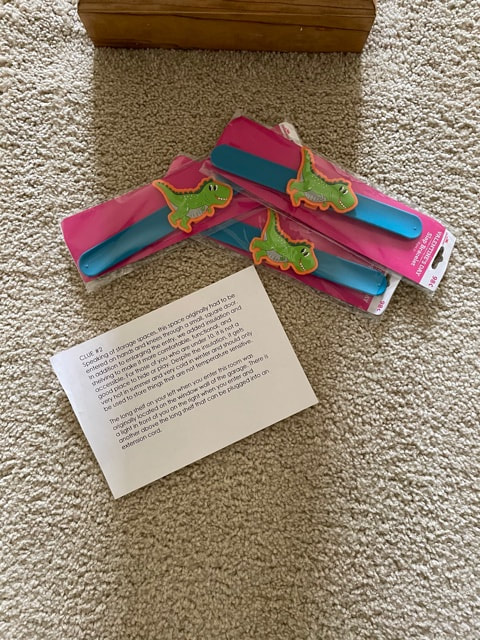
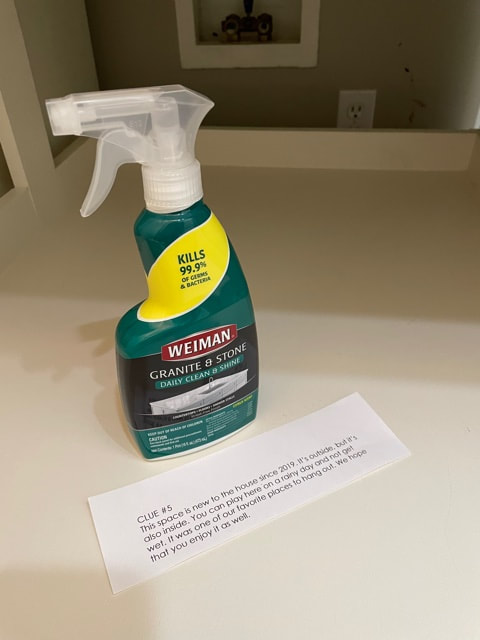

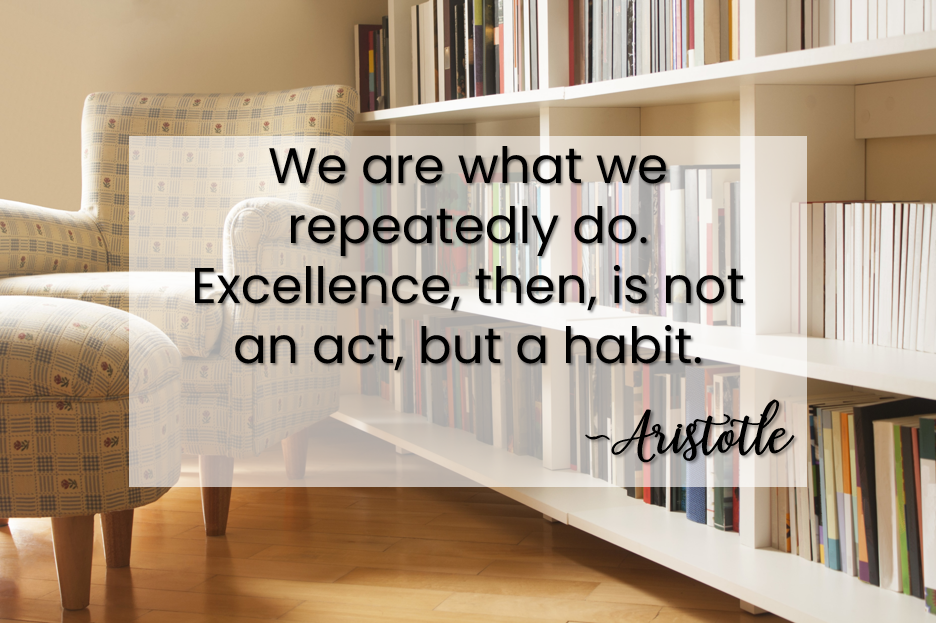
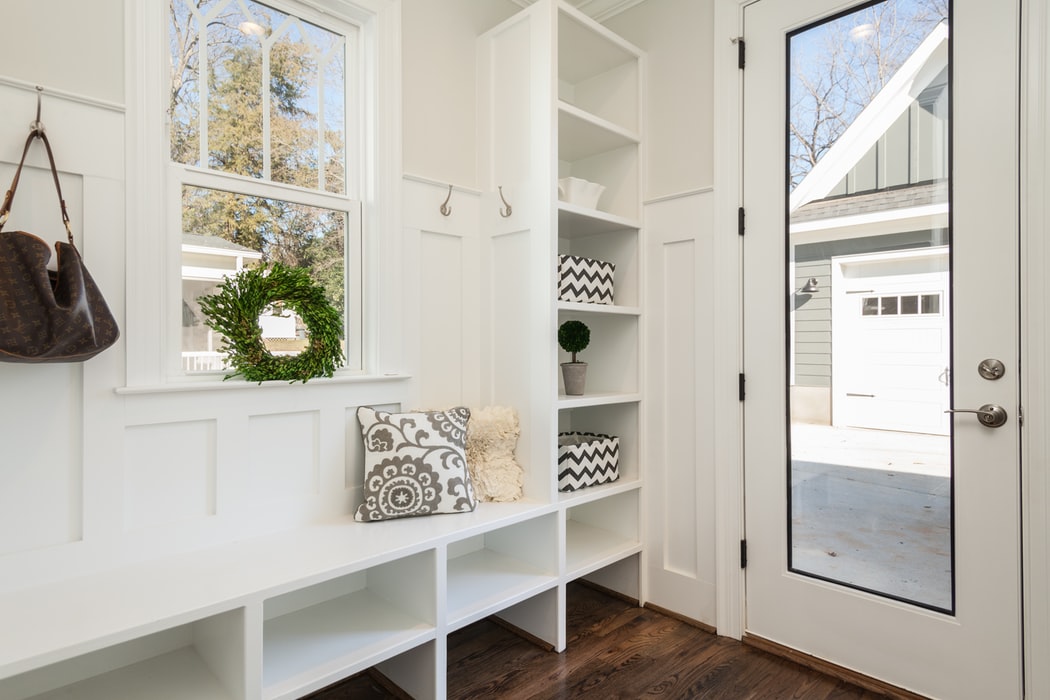
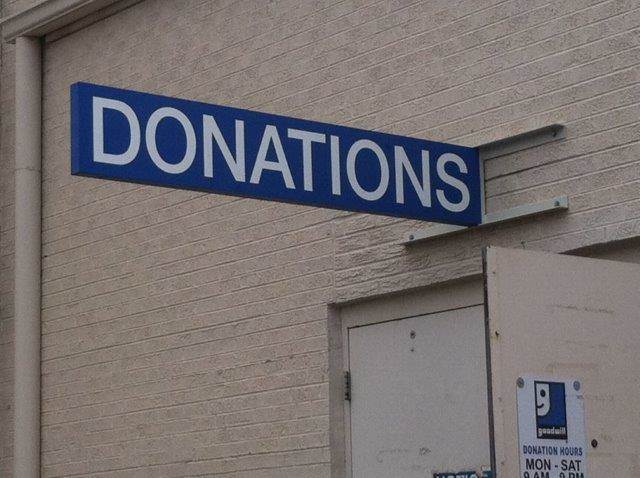
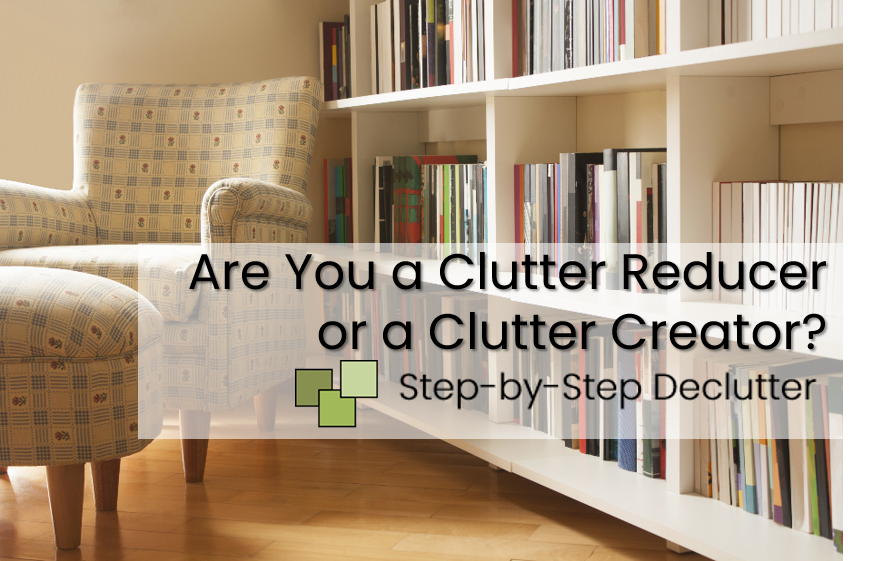
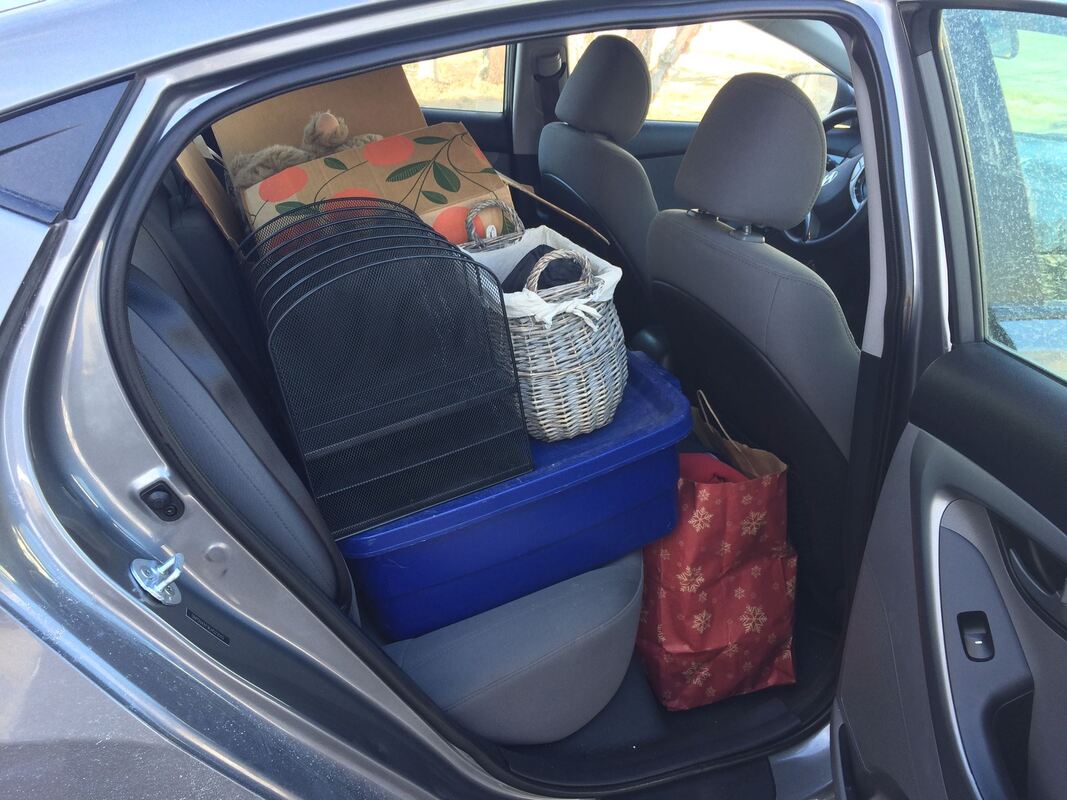
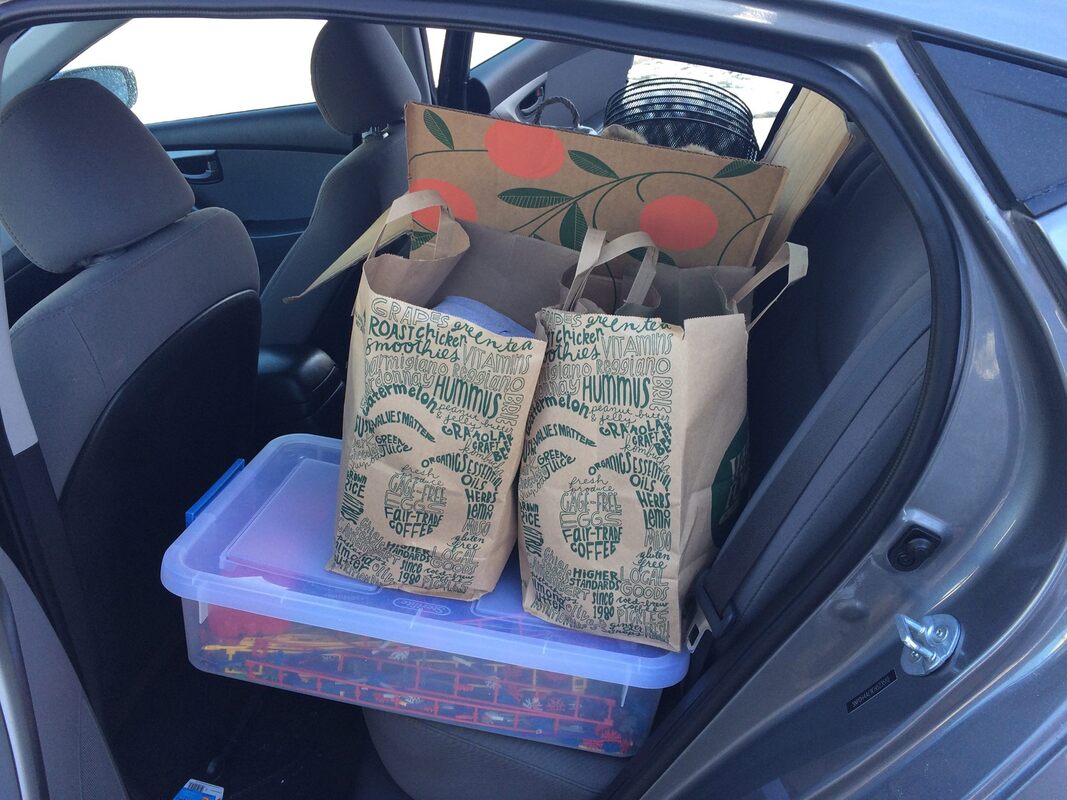
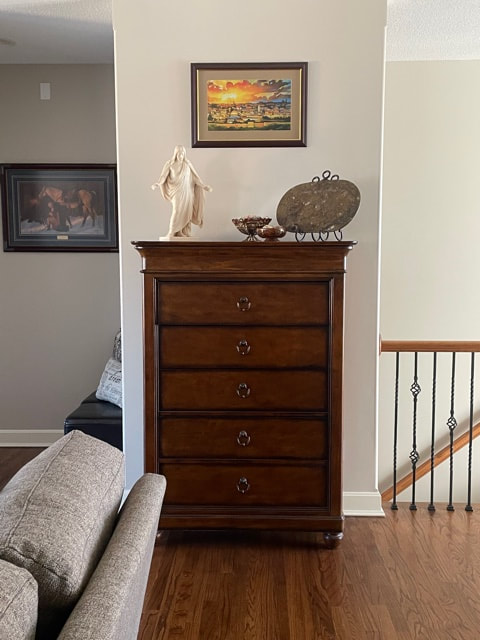
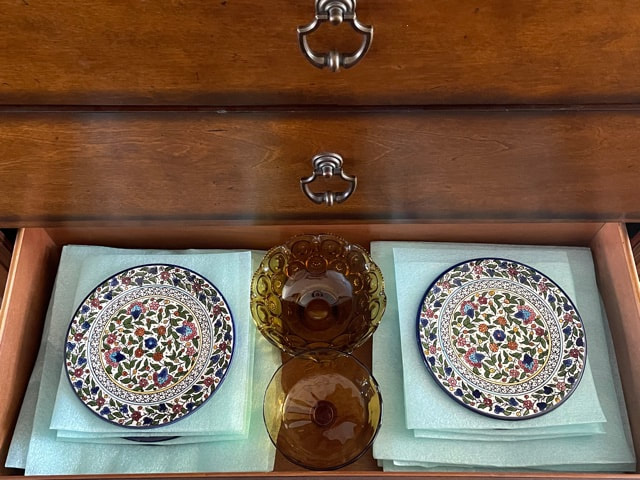
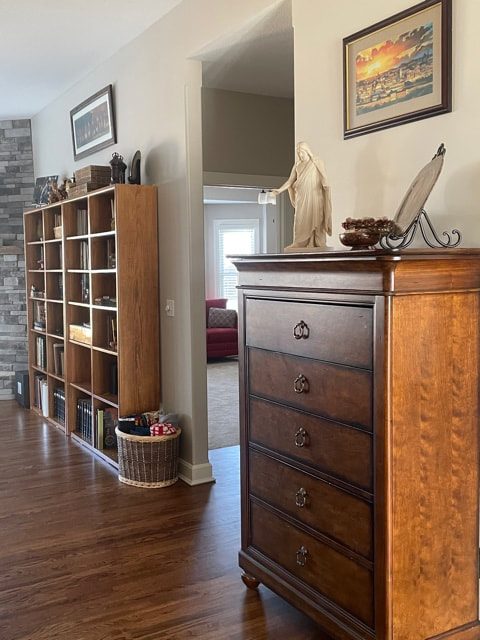
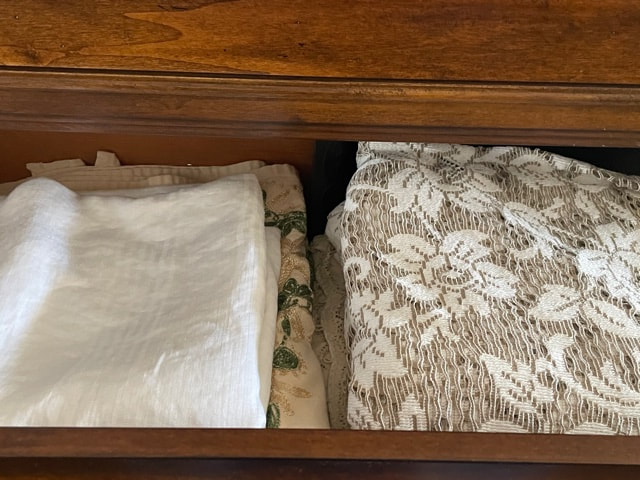
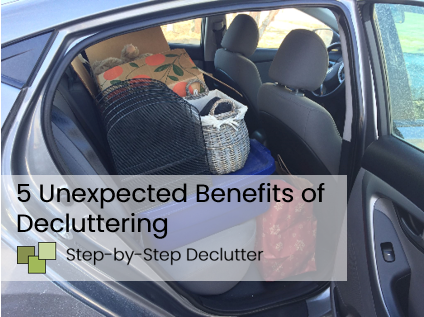

 RSS Feed
RSS Feed